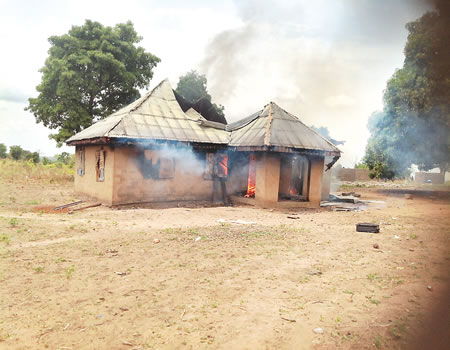
AS time ticks toward the November 1, 20017 take-off date of the Anti-Grazing Law in Benue State, there is palpable fear among residents over an alleged attack by Fulani herdsmen who are against the law, despite the state government’s assurance that there is no cause for alarm.
Another issue giving vent to the supposed attack is that early last week, the national president of the Miyetti Allah Cattle Breeders Association (MACBAN), Muhammad Kirowa, visited Benue State during which he asked the state government to give more time for the law to take off, but the state governor, Samuel Ortom, declined the request, arguing that enough publicity and sensitization had been done for about five months.
For decades, Benue State has lived up to its billing as ‘the fruit basket of the nation’. Traders from different parts of the country often flock to the state to buy food crops, especially yam. But that sobriquet is fast going into oblivion as the encroachment of herdsmen on farms across the state has continued to threaten food production, including lives and properties.
As food production continued to dwindle, including economic activities connected with it, Governor Ortom, on assumption of office, took a decisive step to put to rest the perennial clashes between herdsmen and farmers which was threatening peace in the state, by fashioning out a law that would punish not only herdsmen who destroy farmers’ crops, but also cattle rustlers.
Having done that, Governor Ortom paid a visit to Aso Rock to brief President Muhammadu Buhari on the journey so far his state. Before then, Governor Ortom had also constituted committees in all the localities across the state, made up of natives, traditional rulers, security agents, vigilantes, herdsmen and others, to sensitise people, particularly herdsmen, on the norms of the new law and its implications.
“What we are doing in the state is to continue to live up to our constitutional responsibility of protecting the lives and property of every one resident in the state. We do not have any industry here in Benue, our industry is agriculture. With increase in population, land is no longer available for grazing because everybody is back to farm.
“But sadly, every year, there has been attacks between herdsmen and farmers and we cannot continue like that. If we should allow things to continue the way it was, the crisis may consume everyone. What we are doing is to ensure that every one lives in peace and with the enactment of the anti grazing law, every one living here, must live within the ambit of the law,” he stated.
In an interactive session with newsmen after his visit to President Buhari penultimate Tuesday, Ortom said that he had informed the president that there was no going back on the implementation of the anti-open grazing law, saying, “for us in Benue, that is the only panacea for peace between farmers and herdsmen. For us, we are farmers and we have no other land. Our land is saturated with farming activities, so there is no room for open grazing. Those who want to stay and farm should do so, while those who want to do cattle farming should stay and ranch their cattle.”
However, the umbrella body of the three major ethnic groups in the state is not taking things lying low over the alleged plot to unleash terror on Wednesday, the take-off date of the anti-grazing law. The group also predicated their fear on the statement credited to another group of cattle herders, Miyetti Allah Taora Kaore, which had challenged the anti open grazing law at the Federal High court in Abuja, claiming that the herders were part of Benue valleys and had been there before all the three major ethnic groups in the state.
The association, which consists of the Forum of Mdzough U Tiv, Idoma National Forum and Omi Nyigede, through its spokesman, Edward Ujege, explained that there was a security report of a plot to invade the state through Nigerian/Cameroon border with cows and militia to cause mayhem in order to truncate the anti open grazing law.
He noted that the threat should not be taken with levity, considering the approaching of the dry season when the nomadic herdsmen would be moving southward to graze their cattle on Benue land, considered fertile ground for grazing.
According to Ujege, “our major source of worry now is the privileged information we gathered that they are amassing at the Nigerian/Cameroon border, with both cows and militia and in Nasarawa State at the border with Benue state just waiting for the right time to move into Benue and attack the people.
The vivid explanation of the law is that no individual or group shall after the commencement of the law engage in open nomadic livestock herding or grazing in the state, outside the permitted ranches.
It also provides that anyone who engages in open grazing in Benue State on conviction will be liable to five years imprisonment. However, the law provides for monetary compensation in case of any damage to a property and imprisonment of two years of the livestock owner or manager in case of injury to any person in the state.
“Where such contravention causes the death of any person within the state, the owner or manager of such livestock shall be guilty of an offense of culpable homicide punishable under the penal code law,” the law states in part.
The law also further stipulates that “anyone who engages in cattle rustling shall be liable on conviction for imprisonment of a term not less than three years or payment of one hundred thousand per animal or both.
Commendation for Ortom
Meanwhile various groups and leaders across the state have continued to pour commendation on Governor Ortom for his courageous move to put the final nail in the coffin of herders/farmers’ clashes in the state.
According to the spokesman of the pan socio cultural group, Engineer Ujege, “we are solidly behind Governor Samuel Ortom; our support for him is 110 percent. Come rain, come shine, we are with him and come November 1st which is the date for the commencement of the implementation of the law, whatever legal means or action that is taken, we are with him. We will make sure that the law is applied to each and everyone.”
Second Republic minister of communication, Pa Isaac Shaahu also commended the governor. According to him, “In Benue we are farmers. Grazing is no longer in vogue globally because of the population. There is no land here again to graze, so the best option now is ranching of animals. So we are strongly behind our governor with the anti open grazing law.”
MACBAN president, Kirowa, has also commended the governor, saying: “We thought that the law was instituted as a way of driving herdsmen out of Benue, but coming here and having deep knowledge of the law which is aimed at protecting lives and property, we are ready to abide by it.”
Speaking on its anti-open grazing law position, the Miyetti Allah Kauta Hore, a group of herders different from MACBAN, alleged that Governor Ortom only decided to initiate the anti grazing law after falling out with his alleged ally, Terwase Akwaza aka Ghana whom they said was behind cattle rustling in Benue State.
Responding, Ortom’s Chief Press Secretary, Terver Akase, said “the mention of Akwaza, allegedly as an ally of Governor Ortom is also an indication that Miyetti Allah Kauta Hore officials are not familiar with the security situation in Benue State. If they were, they would have known that Akwaza… has since been declared wanted by security agencies over murder, cattle rustling and other criminal activities.
However, as November 1, the takeoff date of the anti grazing law draws nearer and all eyes are fixed on cattle herders to respect the law, MACBAN president, Alhaji Kirowa said though his group has dissociated itself from Miyetti Allah Kauta Hore’s actions, he explained that the latter was entitled to its opinion, thus fueling the notion that all is not well yet.
WATCH TOP VIDEOS FROM NIGERIAN TRIBUNE TV
- Let’s Talk About SELF-AWARENESS
- Is Your Confidence Mistaken for Pride? Let’s talk about it
- Is Etiquette About Perfection…Or Just Not Being Rude?
- Top Psychologist Reveal 3 Signs You’re Struggling With Imposter Syndrome
- Do You Pick Up Work-Related Calls at Midnight or Never? Let’s Talk About Boundaries







